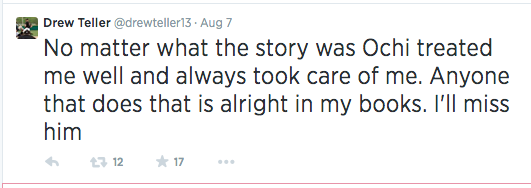The text from my mother read: “You should control her right from the beginning. Kids respect you that way.”
I froze in shock as I read this, the most naked statement I’d ever heard my mother make about her parenting philosophy. We were discussing the upcoming birth of my daughter and how excited I am to meet her, to learn her personality, much as I would a new friend.
My mother’s statement especially shocked me for another reason – the simple fact that she’d raised my siblings and me in a singularly laissez faire manner for the first half of our childhood. Toward the end, we didn’t even live in the same house as my parents. We lived next door in a completely separate house where we made our own meals, did our own chores, and generally lived unsupervised except for occasional, unexpected, and confusing crack downs. Periodically, my parents threatened to and sometimes did install devices, sensors, etc. to monitor our movements. I particularly remember when my stepfather installed a front door sensor, which was intended to send a signal to their house whenever we entered or exited. We used to have fun deliberately tripping it, over and over again until my mother would call us to yell angrily. There was also a sensor for the driveway. A car driving over it would set off yet another signal in my parents’ house, letting them know what time we were arriving home or alerting them that we were trying to sneak our car out the drive. I think, though, that the signals must have become annoying to them as they were eventually disabled.
Despite what these strange and draconian tactics seemed to imply, my parents were generally not involved in our lives. They neither knew our teachers nor our favorite TV shows. My mother had no idea that I loved to read until I was 16. They played no active role and my friends always said that it was funny they had never met my parents. So, one can see why I was somewhat taken aback by my mother’s text. Her peculiar mix of obsessive control and lack of involvement didn’t seem to match up with her stated belief that kids should be controlled from birth so that they learn to fear their parents.
It took me awhile to look back and see it, but I think I now know why she wrote that text. Before my stepfather arrived, I grew up in a pretty secular household. We went to church exactly three times in my early childhood. In fact, I’m not even sure what inspired these attempts at religiosity; none of us actually believed. But when I was 13, my mother married a nice, soft-spoken Catholic man who attended mass every week. She decided that we should all join him, so that we’d be a nice family. It was all very strange, new, and boring for us, but we went. Soon thereafter, she began to crack down on us in new ways, such as the sensors, redoubling her efforts to mold us into that nice family. But it was too late for us. We hadn’t grown up that way and the change was extremely confusing. Naturally, we rebelled.
About then, with my stepfather, my mother also began listening to talk radio. My mother’s favorite show was Dr. James Dobson’s call-in parenting and family advice show. Dobson is the founder of Focus on the Family, an evangelical non-profit association that is the vehicle for his conservative, fundamentalist views on social policy and family life. Dobson is also a psychologist and spends much of his time pontificating on parenting. He has authored several books on the subject and is considered an authority amongst his flock. His views on parenting can basically be summed up as training a child to be fearful of and responsive to authority.
I was too busy being a teenager at the time to notice, but it seems that my mother was quietly buying into the teachings of Dobson and other advocates of authoritarian parenting, such as Michael and Debi Pearl, who advocate abusing infants in the name of a godly family life. Luckily for us, my siblings and I were all of, or approaching, an age at which the physical discipline central to these teachings would be ineffective. The only option remaining is what I call psychological warfare.
I don’t use this term lightly. Dobson’s and the Pearls’ teachings are based on the idea that your children are, quite literally, the enemy, that they are born in original sin, and that their spirit must be crushed in the name of god. They reduce family life to a power struggle, a microcosm of that greater struggle between good and evil that evangelicals quite literally believe in. If you are unfamiliar with these teachings, check out Libby Anne’s blog, Love, Joy, Feminism, where she, as survivor of such abuse, recounts her story, the stories of others, and even critiques the Pearls’ seminal works, passage by passage. You can find other survivors’ stories at No Longer Quivering and Homeschoolers Anonymous. You will quickly see that families that adhere to these teachings are not only families in which children are the enemy, but they are also families where the abuse can be so severe that children are murdered by their parents.
Again, I was very lucky. I did not endure the kinds of physical abuse that many suffered because I was too old by the time my mother became interested and she was only ever a peripheral devotee, nor was I homeschooled and therefore isolated. But I did suffer knowing that my mother never accepted me for who I was. She regarded me merely as a naturally disobedient child who couldn’t even be kept in check, or fundamentally changed, by years of emotional turmoil and unconscionable surveillance. It took me quite some time to recover from the feeling of never being okay as I am. Even today, I find myself surprised that children around me are granted a basic level of privacy that I could never imagine as a kid. Their parents don’t periodically upend their bedrooms in military-like searches for I-never-figured-out-what, don’t listen in on their phone calls, and don’t threatened them with surveillance cameras.
It now seems like this happened to a different Autumn. I have no idea where it came from, but I had always been a pretty “rebellious” spirit with some seriously feminist leanings. I am grateful for that because I think it’s the only reason I, a very troubled and emotional child, didn’t crumble. It will be the only reason why I can commit to letting my daughter tell me who she is as a person, while providing healthy boundaries with plenty of space for her to explore.
***
After sitting for a moment with the phone in my hand, contemplating that text, I wrote back, “I don’t see the connection. I know that I never felt respect for any adult who tried to control me.”





 Iris Vander Pluym is an artist, activist and writer based in New York City. Raised to believe Nice Girls™ never discuss religion, sex or politics, it turns out those are pretty much the only topics she ever wants to talk about. A self-described “unapologetic, godless, feminist lefty,” Ms. Vander Pluym blogs at
Iris Vander Pluym is an artist, activist and writer based in New York City. Raised to believe Nice Girls™ never discuss religion, sex or politics, it turns out those are pretty much the only topics she ever wants to talk about. A self-described “unapologetic, godless, feminist lefty,” Ms. Vander Pluym blogs at 
 Marina Martinez lives in Portland, Oregon with her boyfriend, Ben, her dog, Pepper, and her cat, Medusa. She enjoys being fat, being loud, long walks on the beach, and general awesomeness. You can find her on Twitter
Marina Martinez lives in Portland, Oregon with her boyfriend, Ben, her dog, Pepper, and her cat, Medusa. She enjoys being fat, being loud, long walks on the beach, and general awesomeness. You can find her on Twitter 
 Sara affectionately refers to herself as a “millennial on a mission.” This mission? Creating a safer world for everyone, particularly women and non-religious folks in all the vast corners of the earth. Sara truly believes that education and cultural awareness will pave the way for tolerance, a virtue desperately needed in these extremely difficult and tumultuous times. Currently earning her Master’s degree in public policy, Sara fights relentlessly for women’s rights and separation of church and state on a policy level by regularly speaking out and lobbying on behalf of these causes. She has written for and worked with several organizations; a monthly columnist for Sacramento Reason and a weekly writer for The Humanist, she hopes to reach an even wider audience through Secular Woman, telling stories, sharing knowledge, and contributing to the growth of the secular women’s movement.
Sara affectionately refers to herself as a “millennial on a mission.” This mission? Creating a safer world for everyone, particularly women and non-religious folks in all the vast corners of the earth. Sara truly believes that education and cultural awareness will pave the way for tolerance, a virtue desperately needed in these extremely difficult and tumultuous times. Currently earning her Master’s degree in public policy, Sara fights relentlessly for women’s rights and separation of church and state on a policy level by regularly speaking out and lobbying on behalf of these causes. She has written for and worked with several organizations; a monthly columnist for Sacramento Reason and a weekly writer for The Humanist, she hopes to reach an even wider audience through Secular Woman, telling stories, sharing knowledge, and contributing to the growth of the secular women’s movement.

 Corrina Allen has been an educator in Central New York for the last decade and is the founder and president of the
Corrina Allen has been an educator in Central New York for the last decade and is the founder and president of the 
